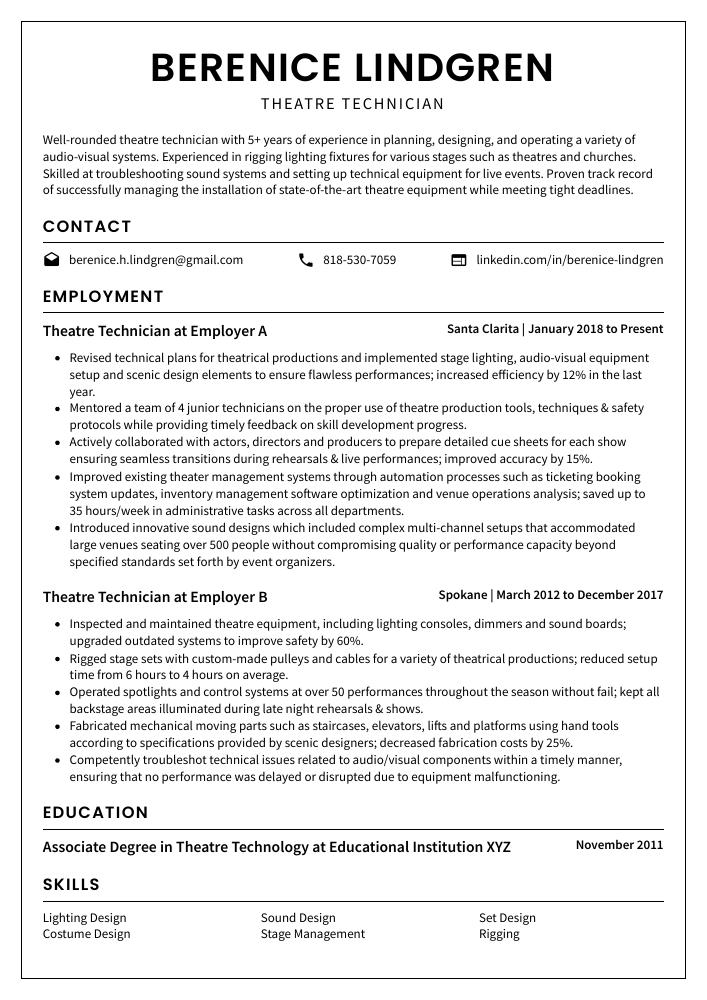Theatre Technician Resume Guide
Theatre technicians are responsible for the technical aspects of theatrical productions. They set up, operate and maintain equipment such as lighting and sound systems, assemble sets and props, coordinate movement on stage during performances, ensure safety protocols are followed backstage and more.
Your theatrical lighting and sound experience is unmatched, but potential employers don’t know about your credentials. To get them to take notice of you, create a resume that highlights all the great work you’ve done in the past.
This guide will walk you through the entire process of creating a top-notch resume. We first show you a complete example and then break down what each resume section should look like.
Table of Contents
The guide is divided into sections for your convenience. You can read it from beginning to end or use the table of contents below to jump to a specific part.
Theatre Technician Resume Sample
Berenice Lindgren
Theatre Technician
[email protected]
818-530-7059
linkedin.com/in/berenice-lindgren
Summary
Well-rounded theatre technician with 5+ years of experience in planning, designing, and operating a variety of audio-visual systems. Experienced in rigging lighting fixtures for various stages such as theatres and churches. Skilled at troubleshooting sound systems and setting up technical equipment for live events. Proven track record of successfully managing the installation of state-of-the-art theatre equipment while meeting tight deadlines.
Experience
Theatre Technician, Employer A
Santa Clarita, Jan 2018 – Present
- Revised technical plans for theatrical productions and implemented stage lighting, audio-visual equipment setup and scenic design elements to ensure flawless performances; increased efficiency by 12% in the last year.
- Mentored a team of 4 junior technicians on the proper use of theatre production tools, techniques & safety protocols while providing timely feedback on skill development progress.
- Actively collaborated with actors, directors and producers to prepare detailed cue sheets for each show ensuring seamless transitions during rehearsals & live performances; improved accuracy by 15%.
- Improved existing theater management systems through automation processes such as ticketing booking system updates, inventory management software optimization and venue operations analysis; saved up to 35 hours/week in administrative tasks across all departments.
- Introduced innovative sound designs which included complex multi-channel setups that accommodated large venues seating over 500 people without compromising quality or performance capacity beyond specified standards set forth by event organizers.
Theatre Technician, Employer B
Spokane, Mar 2012 – Dec 2017
- Inspected and maintained theatre equipment, including lighting consoles, dimmers and sound boards; upgraded outdated systems to improve safety by 60%.
- Rigged stage sets with custom-made pulleys and cables for a variety of theatrical productions; reduced setup time from 6 hours to 4 hours on average.
- Operated spotlights and control systems at over 50 performances throughout the season without fail; kept all backstage areas illuminated during late night rehearsals & shows.
- Fabricated mechanical moving parts such as staircases, elevators, lifts and platforms using hand tools according to specifications provided by scenic designers; decreased fabrication costs by 25%.
- Competently troubleshot technical issues related to audio/visual components within a timely manner, ensuring that no performance was delayed or disrupted due to equipment malfunctioning.
Skills
- Lighting Design
- Sound Design
- Set Design
- Costume Design
- Stage Management
- Rigging
- Automation
- Carpentry
- Painting
Education
Associate Degree in Theatre Technology
Educational Institution XYZ
Nov 2011
Certifications
Theatre Technician Certification
USITT (United States Institute for Theatre Technology
May 2017
1. Summary / Objective
A resume summary/objective is the first thing a potential employer will read and it should be an attention-grabber. In your summary, you can highlight your expertise in theatre technology such as lighting systems, sound boards, rigging equipment and more. You could also mention any awards or recognition you have received for outstanding work on past productions as well as how many years of experience you have in this field.
Below are some resume summary examples:
Diligent theatre technician with 5+ years experience in theatre technical production. Expertise in operating theatrical lighting, sound systems, and stage machinery for large-scale productions. At XYZ Theatre, led the installation of a new audio system resulting in improved acoustics and audience satisfaction ratings by 25%. Proven ability to troubleshoot problems quickly and efficiently while managing multiple tasks under strict deadlines.
Proficient theatre technician with 10+ years of experience in stage lighting, audio engineering, and rigging. Experienced in troubleshooting technical issues and maintaining equipment for theatrical performances. Adept at working independently or collaboratively to ensure the successful execution of live events. Committed to providing quality technical support for all stages of production from pre-production through post-show wrap up.
Dependable theatre technician with 5+ years of experience in lighting, sound, and set design. Experienced in developing innovative solutions to technical challenges for both live shows and recordings. At XYZ Theatre, designed a complex network of lights that earned the highest rating from audience members during an off-Broadway production. Received recognition as “The Best Technician” from ABC Company three consecutive times.
Amicable theatre technician with 8+ years of experience in delivering technical support for live theatre and music events. Looking to join ABC Arts as a senior technician, where I can apply my knowledge of audio/visual equipment and event production techniques to ensure high-quality shows. In previous roles, successfully managed the setup and breakdown of over 200 theatre productions within budget requirements.
Hard-working and experienced theatre technician with 5+ years of experience in installing, operating and maintaining theatrical equipment. Skilled at troubleshooting issues with lighting, sound systems and other technical aspects to ensure a successful performance. Seeking to use my expertise at ABC Theatre as the Technical Manager where I can contribute towards creating memorable productions for audiences.
Reliable and experienced theatre technician with over 7 years of experience in stage and lighting management. Proven track record of successful project completion, including the installation and repair of audio-visual equipment for a variety of events, from concerts to Broadway shows. Resourceful problem solver who can troubleshoot issues quickly and efficiently to ensure production runs smoothly.
Professional theatre technician with 5+ years of experience operating and maintaining lighting, sound equipment, and other technical elements for live stage productions. Certified in Pro Tools 10/11 audio production software. Eager to join ABC Theatre Company to design innovative solutions that support the creative vision of directors while providing a safe environment for actors and crew members.
Seasoned theatre technician with 8+ years of experience in the theatre industry. Seeking to join ABC Theatre as a Technical Director and use my expertise in theatrical lighting, sound systems, rigging equipment and stage management to ensure smooth running performances. Experienced in supervising teams of technicians while also troubleshooting technical issues during live shows.
2. Experience / Employment
The work history/experience section is where you list your previous jobs. It should be written in reverse chronological order, which means the most recent job is listed first.
Stick to bullet points when writing this section; it makes it easier for the reader to take in what you have said quickly and efficiently. When talking about each role, make sure that you provide detail on what you did and any results or accomplishments achieved.
For example, instead of saying “Installed lighting equipment,” say something like “Installed theatre lighting systems for a variety of shows with an average setup time of 3 hours.”
To write effective bullet points, begin with a strong verb or adverb. Industry specific verbs to use are:
- Installed
- Assembled
- Operated
- Programmed
- Adjusted
- Troubleshot
- Rigged
- Inspected
- Calibrated
- Connected
- Monitored
- Fabricated
- Dismantled
- Repaired
- Tested
Other general verbs you can use are:
- Achieved
- Advised
- Assessed
- Compiled
- Coordinated
- Demonstrated
- Developed
- Expedited
- Facilitated
- Formulated
- Improved
- Introduced
- Mentored
- Optimized
- Participated
- Prepared
- Presented
- Reduced
- Reorganized
- Represented
- Revised
- Spearheaded
- Streamlined
- Structured
- Utilized
Below are some example bullet points:
- Installed and repaired a wide variety of audio, video and lighting equipment for over 50 theatrical productions; significantly reduced setup time by 20% on average.
- Troubleshot technical issues with the stage machinery and sound systems during live performances, quickly resolving any problems in order to ensure smooth running of shows.
- Streamlined processes for storing production-related assets such as props & costumes in an organized manner, minimizing search times from 10 minutes to 5 minutes per item on average.
- Confidently operated complex electrical control boards while orchestrating light cues at rehearsals or onstage; trained 3 new technicians under supervision within 1 month of hire date.
- Provided reliable support services before/during/after each performance including coil winding cordless microphones & rigging lights overhead; earned perfect safety ratings throughout entire tenure at the theatre company.
- Tested and maintained audio-visual equipment on a regular basis, increasing the reliability of all theatre systems by 75%.
- Formulated and implemented preventative maintenance plans for lighting systems; reduced downtime due to technical faults by 32%.
- Consistently met deadlines while building sets and props for theatrical productions, completing projects up to 3 days ahead of schedule in some cases.
- Participated in rehearsals with actors & actresses as part of set construction & design team; incorporated feedback from directors into final product within budget constraints.
- Coordinated between technicians, stage managers and production crew members throughout development process; decreased overall project duration by 20 hours per show on average.
- Reorganized the theatrical lighting, sound and set systems for 15+ productions annually, leading to a 10% improvement in efficiency.
- Presented creative technical solutions to directors and production teams that improved the overall quality of stage performances; reduced setup time by 3 hours on average.
- Advised cast members on proper use of equipment during rehearsals & shows, resulting in no accidents or injuries reported throughout the year.
- Accurately adjusted light levels as instructed by director while operating console & other backstage machinery; saved $1,500 per show through accurate troubleshooting techniques used instead of purchasing new parts/equipment when possible.
- Represented theatre company at industry events such as conferences & workshops to promote its brand image; gained over 500 followers across social media platforms within 6 months of joining marketing team efforts.
- Assembled, configured and tested audio/visual equipment for over 50 theatrical performances and events; utilized advanced tools such as mixers, amplifiers and speakers to optimize sound quality.
- Monitored stage lighting cues in real-time during shows, making any necessary adjustments to ensure accurate transitions between scenes; increased accuracy by 15%.
- Developed creative solutions for complex audio/visual issues that arose during production rehearsals or live shows; successfully resolved problems without disrupting the flow of performance on more than 30 occasions.
- Efficiently set up dynamic theatre venues with both physical structures (elevators & platforms) and digital components (projections & displays), reducing setup time per show from 8 hours to 4 hours on average.
- Structured daily workflows according to rehearsal schedules assigned by directors while adhering strictly to health & safety guidelines at all times; worked closely with cast members throughout each project’s duration resulting in a successful run every time.
- Adjusted and calibrated lighting, sound and rigging equipment to facilitate smooth running of all theatre performances; reduced set-up time by 25% through efficient organization.
- Expedited the performance process with quick problem solving skills; identified and rectified technical issues in less than 10 minutes on average per show.
- Reliably monitored ongoing production systems during performances, ensuring that safety protocols were followed at all times while upholding exceptional standards of quality control.
- Reduced noise disturbances from backstage areas by 30%, leading to an overall improved audience experience throughout each show run period.
- Created 15+ new light board programs for various theatrical productions, utilizing specialized software applications such as ETC Express & WYSIWYG Design Suite effectively.
- Prepared lighting and sound equipment for over 40 theatre productions, including concerts, plays and musicals; achieved a 20% increase in efficiency by streamlining the setup process.
- Achieved successful show openings with limited resources through careful planning and flawless execution while ensuring maximum audience satisfaction levels.
- Independently managed the maintenance of all audiovisual systems within theater premises; resolved technical issues quickly to minimize downtime during shows.
- Spearheaded efforts to modernize existing lighting & sound equipment, resulting in improved audio-visual quality that enhanced overall production value by 25%.
- Demonstrated excellent problem solving skills when troubleshooting complex electrical problems related to stage equipment on short notice; cut repair time by 30 minutes on average per incident.
- Facilitated the installation and maintenance of lighting, sound, rigging and other theatrical equipment for over 130 performances; saved $2,500 in repairs by utilizing preventative maintenance techniques.
- Utilized software programs such as VectorWorks to program light plots & scenic design renderings for a wide range of musicals, operas & plays; enhanced the production value through creative use of audio/visual elements.
- Programmed highly complex stage controls such as follow spots & automated curtain movements with precision accuracy; successfully operated more than 20 cue-to-cue shows without any issues or delays in performance times.
- Successfully managed multiple projects simultaneously while adhering to strict safety protocols during setup and tear down activities at all venue locations within budget constraints (+$200 under projected cost).
- Compiled comprehensive technical manuals detailing operating procedures for each show including lighting levels per scene and spot positions; created an efficient system that allowed crews to quickly transition between productions on schedule every week.
- Optimized theatre lighting, acoustics and overall stage design for over 20 theatrical productions; reduced production costs by 25% through resourceful optimization of existing equipment.
- Assessed audio/visual needs for each show and stocked required supplies accordingly to ensure seamless technical operations on performance day; saved upwards of $1,000 in unnecessary expenses during the past year.
- Proficiently operated various soundboards and other AV equipment while coordinating with actors/directors to make sure every cue was executed according to plan; completed setup within 2 hours before every show with no errors reported from audience members or staff.
- Dismantled sets & props following performances in a timely manner without damaging any materials or venues’ infrastructure; consistently met deadline expectations set by directors even when facing tight schedules due unfavorable weather conditions etc..
- Connected overhead projectors, amplifiers and other devices as needed using cables per manufacturer instructions thereby providing reliable access to all audio/visual components throughout the duration of multiple shows simultaneously running at same time period.
3. Skills
Skill requirements will differ from employer to employer – this can easily be determined via the job advert. Organization ABC may require the candidate to be experienced in rigging and organization XYZ might need someone with experience in sound engineering.
You want to tailor your skills section of your resume for each job that you are applying for because many employers use applicant tracking systems these days, which scan resumes for certain keywords before passing them on to a human.
It is important not only list the relevant skills here but also provide examples of how you have used them throughout your career; this can be done by elaborating on them further in other sections such as the summary or experience part of your resume.
Below is a list of common skills & terms:
- Automation
- Carpentry
- Costume Design
- Lighting Design
- Painting
- Props Management
- Rigging
- Set Design
- Sound Design
- Stage Management
4. Education
Mentioning an education section on your resume will depend on how far along you are in your career. If you just graduated and have no prior experience, mention your education below the objective statement. However, if you have plenty of work experience to showcase, omitting an education section is okay too.
If including an education section is necessary for the theatre technician role you’re applying for, try mentioning courses taken that relate directly to this position as well as any projects or assignments completed related to it.
Associate Degree in Theatre Technology
Educational Institution XYZ
Nov 2011
5. Certifications
Certifications are a great way to demonstrate your knowledge and expertise in a particular field. They are also proof that you have taken the time and effort to stay up-to-date with industry trends, standards, and best practices.
Including certifications on your resume can help you stand out from other applicants by showing potential employers that you are knowledgeable about the job requirements. Make sure to list any relevant certifications related to the position for which you’re applying so they can be easily identified by recruiters or hiring managers.
Theatre Technician Certification
USITT (United States Institute for Theatre Technology
May 2017
6. Contact Info
Your name should be the first thing a reader sees when viewing your resume, so ensure its positioning is prominent. Your phone number should be written in the most commonly used format in your country/city/state, and your email address should be professional.
You can also choose to include a link to your LinkedIn profile, personal website, or other online platforms relevant to your industry.
Finally, name your resume file appropriately to help hiring managers; for Berenice Lindgren, this would be Berenice-Lindgren-resume.pdf or Berenice-Lindgren-resume.docx.
7. Cover Letter
Submitting a cover letter alongside your resume is a great way to show potential employers why you are the best candidate for the job. It typically consists of 2 to 4 paragraphs and highlights key points that can’t be found in your CV, such as personality traits or transferable skills.
Cover letters may not be necessary for all job applications but they can give recruiters additional insight into who you are and what qualities make you suitable for their role. They also allow applicants to demonstrate enthusiasm and interest in the position which could set them apart from other candidates.
Below is an example cover letter:
Dear Willy,
I am writing to apply for the position of Theatre Technician with the New York Shakespeare Company. As a theatre professional with more than 10 years of experience working in live performance, I am confident that I would make a valuable contribution to your team.
In my current role as Head Technician at the Globe Theatre, I oversee all technical aspects of live productions, including set design and construction, lighting design and operation, sound design and operation, and stage management. My experience has taught me how to think on my feet and solve problems quickly, both essential skills for success in live theatre.
I also have a strong background in customer service, which has come in handy when dealing with difficult customers or managing last-minute changes before a show. My ability to stay calm under pressure is one of my greatest strengths as a technician.
If you are looking for an experienced and detail-oriented theatre technician who is passionate about live performance, then please do not hesitate to contact me. I look forward to discussing this opportunity further with you soon.
Sincerely,
Berenice
Theatre Technician Resume Templates
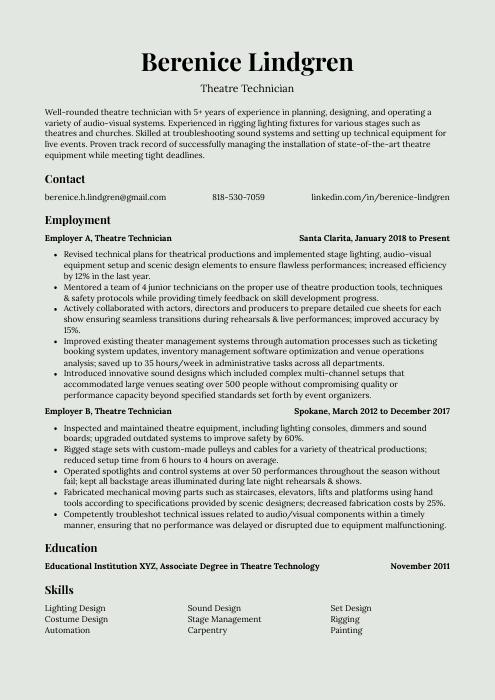 Saola
Saola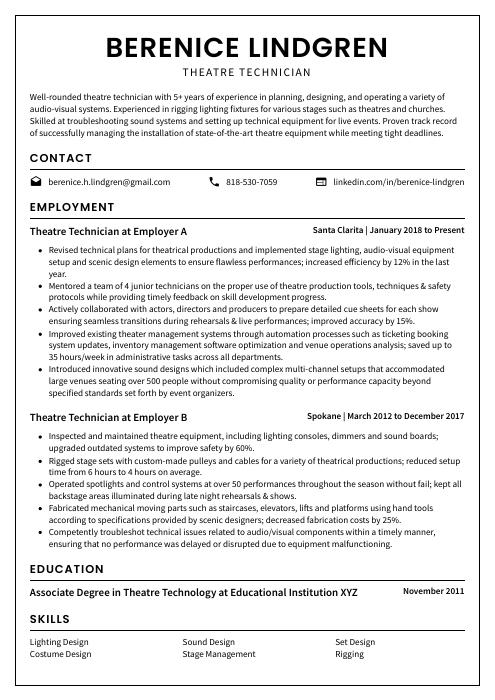 Cormorant
Cormorant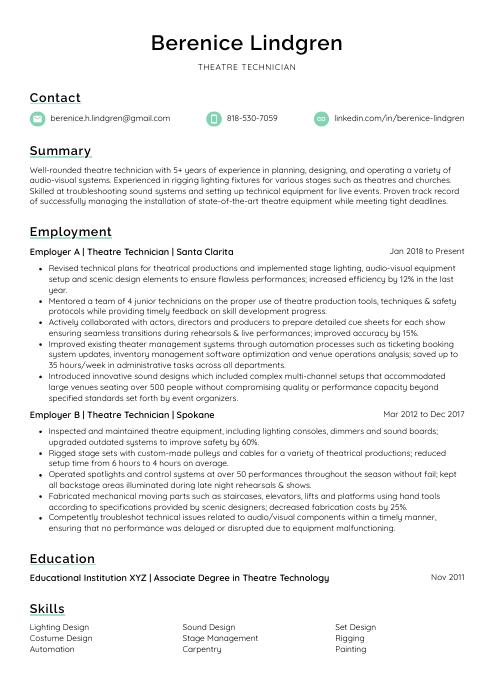 Lorikeet
Lorikeet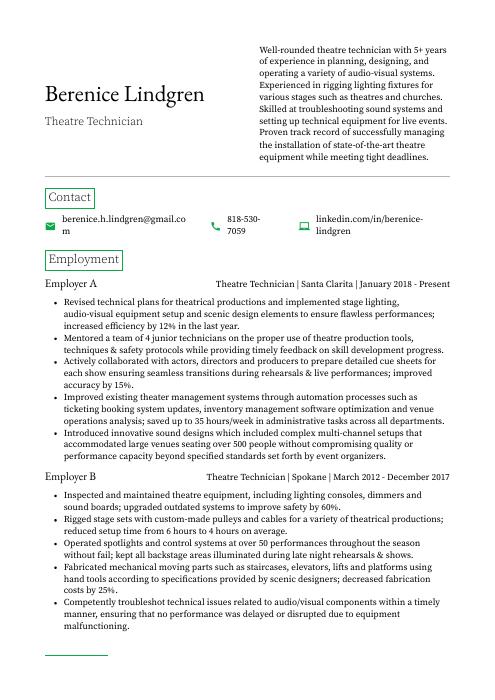 Quokka
Quokka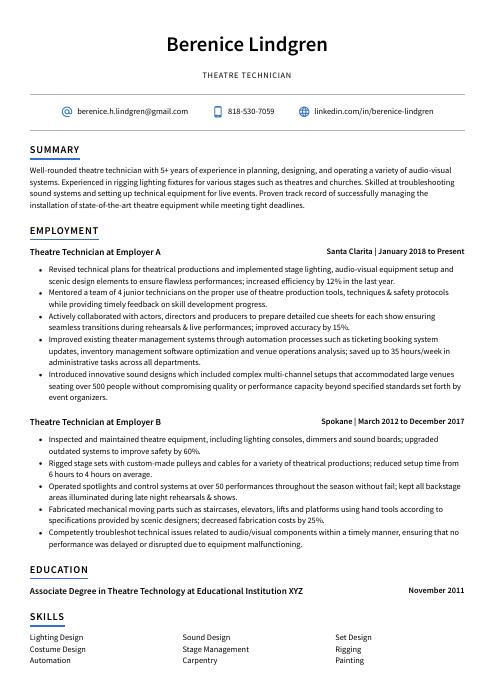 Axolotl
Axolotl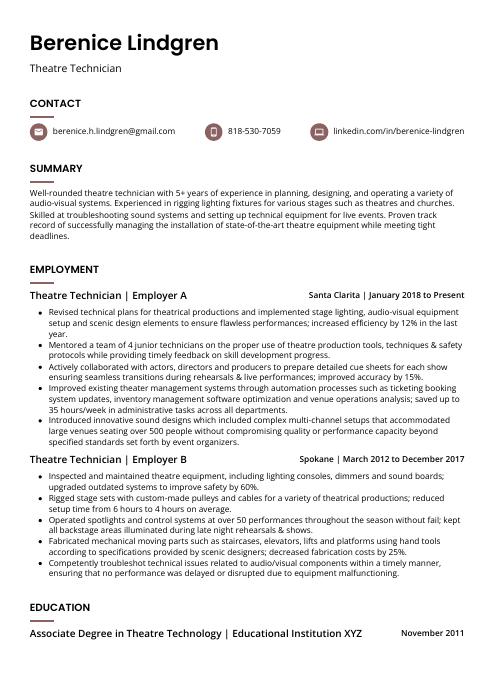 Fossa
Fossa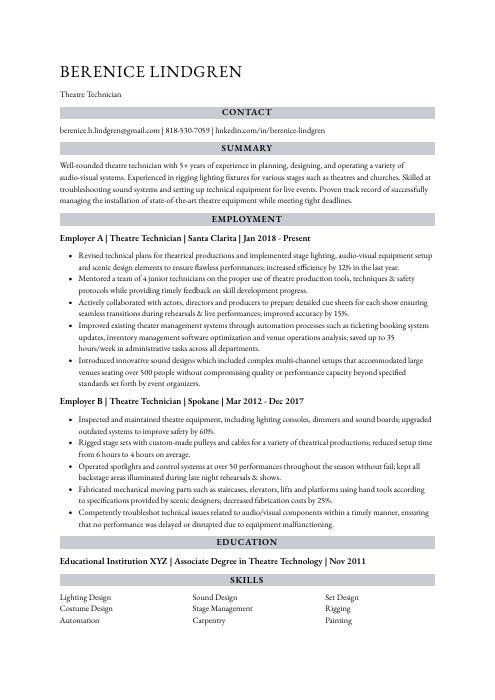 Numbat
Numbat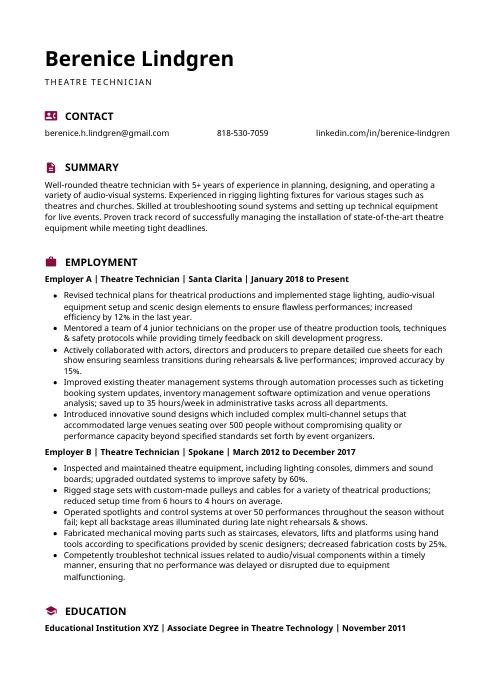 Hoopoe
Hoopoe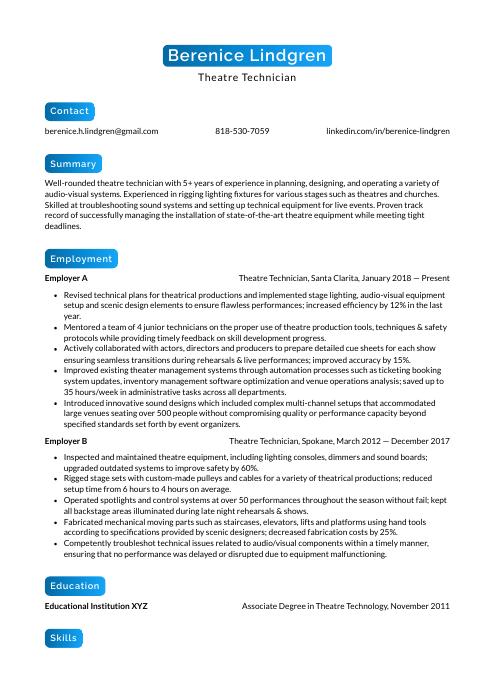 Kinkajou
Kinkajou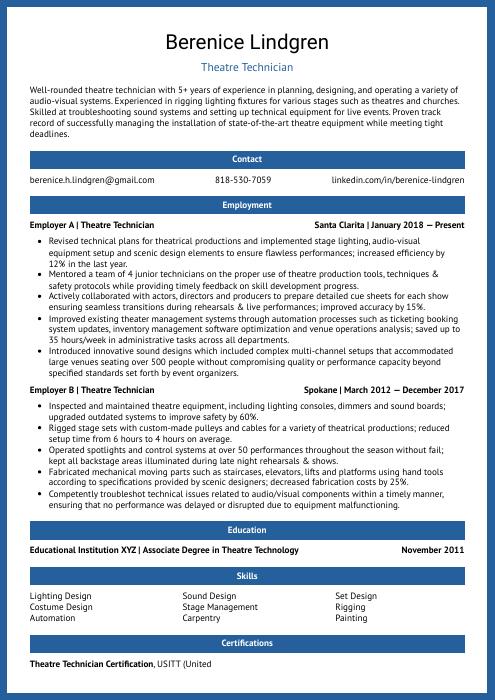 Ocelot
Ocelot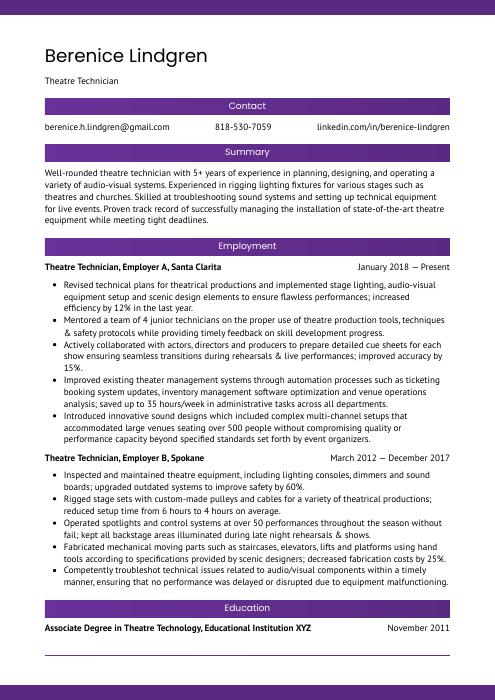 Jerboa
Jerboa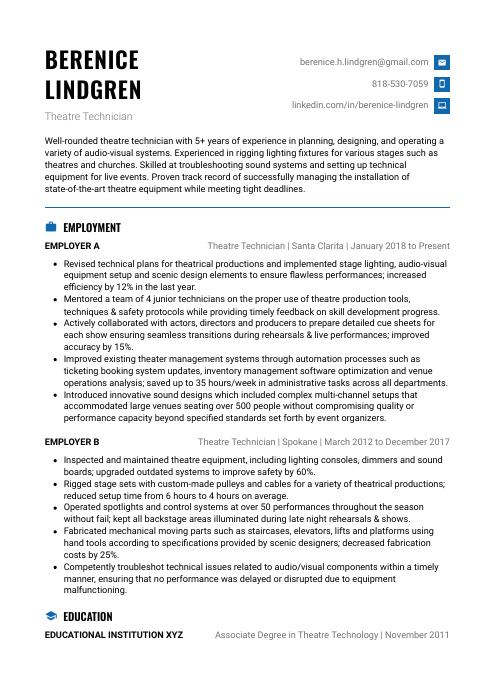 Echidna
Echidna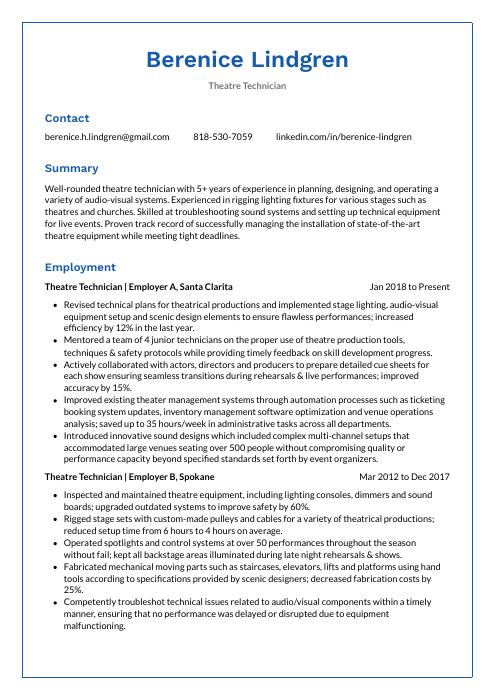 Markhor
Markhor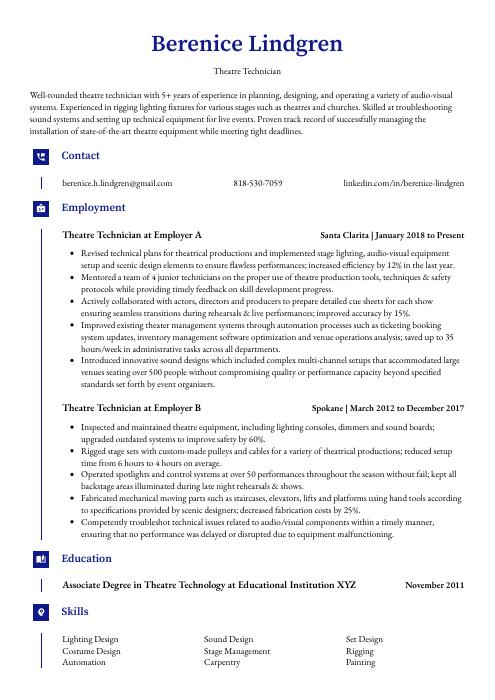 Gharial
Gharial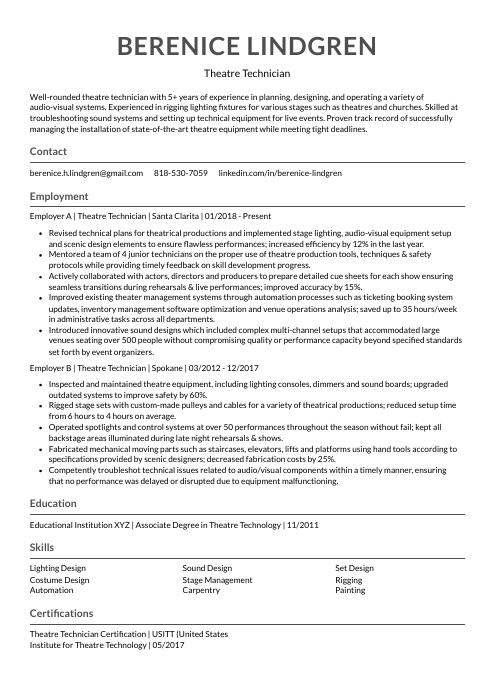 Indri
Indri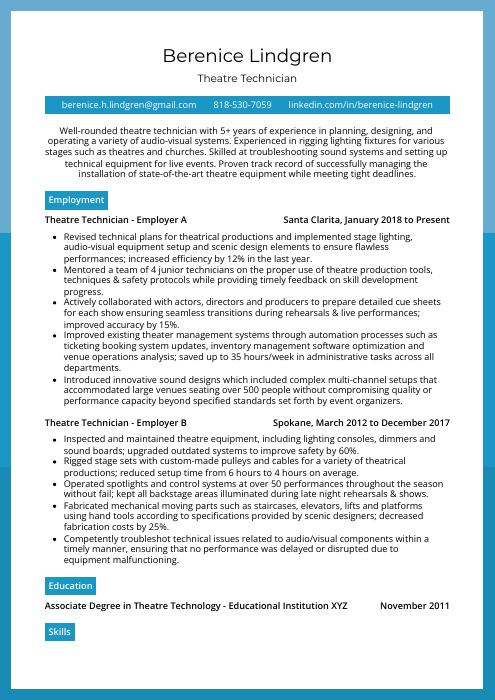 Rhea
Rhea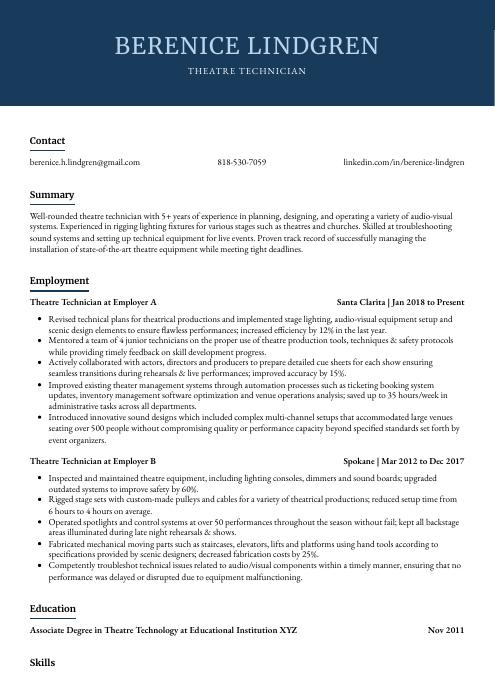 Bonobo
Bonobo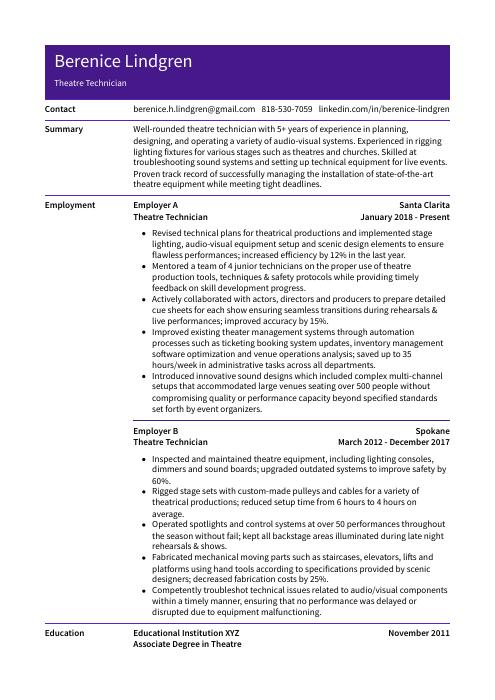 Pika
Pika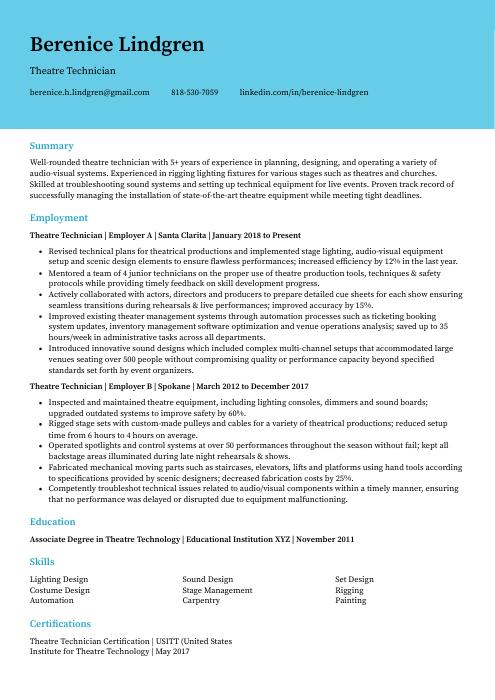 Dugong
Dugong Rezjumei
Rezjumei
